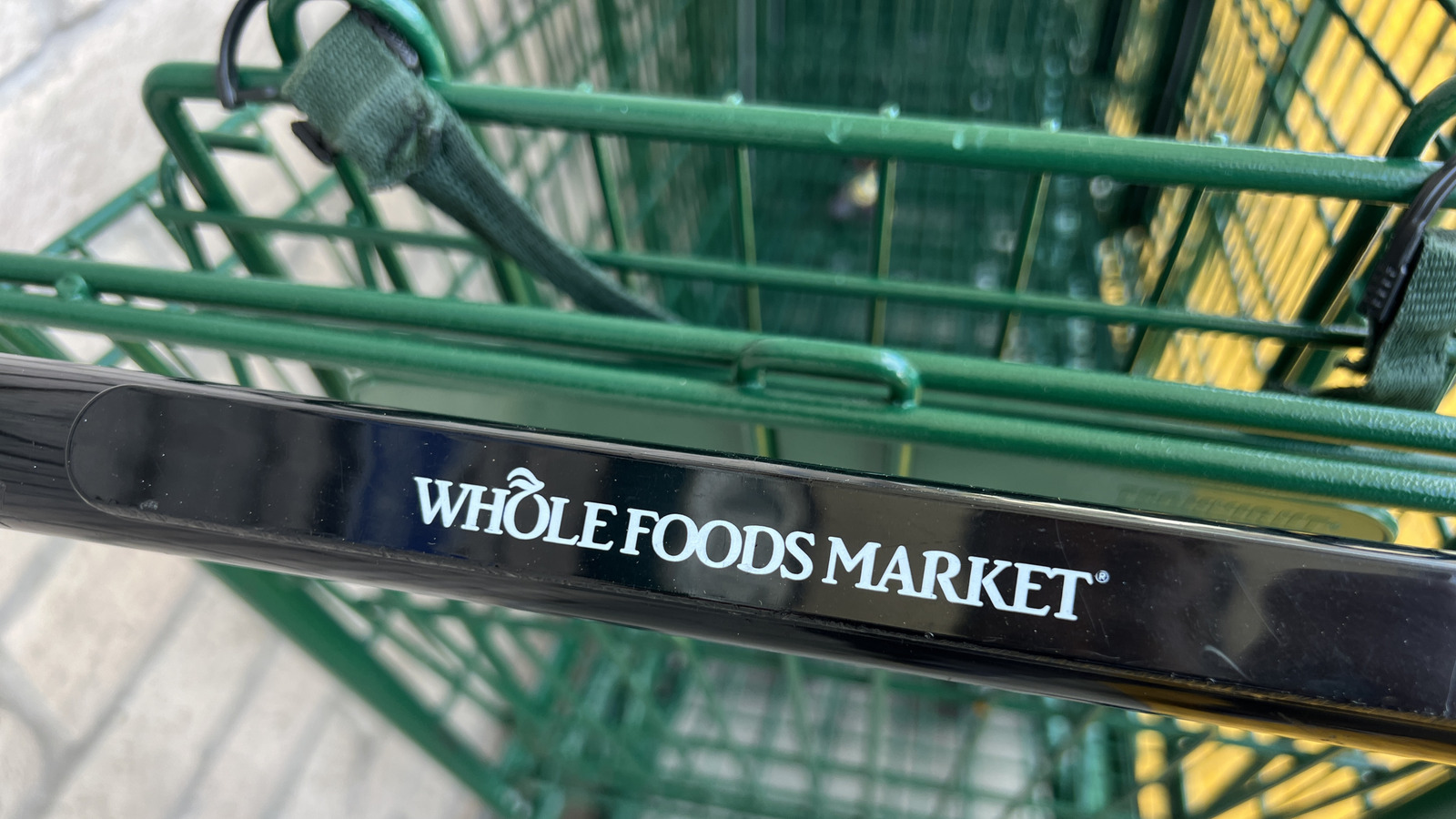When it first opened in 1980, Whole Foods was a grocery chain like no other, prioritizing natural foods, stringent quality standards, and sustainable growing practices. The chain and its products made with good-for-you ingredients has evolved into stores that attract a more health-conscious clientele. Consequently, its supply chain often demands a higher price, which has deterred many from making it a regular stop.
Since Amazon bought Whole Foods in 2017, however, prices are not the only thing that's changed. The retailer continues to rely on its reputation as a wholesome, organic, sustainable grocery stop, but piggy-backing off fast-paced Amazon warehouse protocols and centralized operations has begun to change the spirit of the store. Unfortunately, as Whole Foods becomes more accessible to a wider customer base via Prime deliveries and lowered prices, its original principles of wholesome, sustainable food are falling to the wayside.

It has put more pressure on employees and begun to worry the small farmers who were formerly a large part of the store's supply chain. Furthermore, many of Whole Foods' original principles, such as providing local and natural foods, no longer hold weight as they transform into marketing ploys rather than core values. In addition to these broad strokes changes, the chain has been misleading customers on many fronts since well before Amazon took over.
From mislabelling to overpricing, here are 11 upsetting behind-the-scenes secrets which have revealed that Whole Foods isn't entirely as wholesome as its marketing would suggest. 1. New protocols have hurt local farmers Whole Foods originally emphasized locally sourced products, which allowed for regional differences from store to store.
The most clear, standardized definition of "local" comes from Congresses' 2008 Farm Bill , which states that the total distance a product is transported is "less than 400 miles from the origin of the product; or the State in which the product is produced." This distinction is interpreted loosely, and "local" often does not have a rigid significance. Sometimes it may simply refer to where a brand has its headquarters, which could be nearby, but may have absolutely no relation to where its products come from.
According to the former Whole Foods Global Executive Grocery Coordinator in an interview with the Guardian , the idea of local products "used to be about climate change and developing strong supply chains and regional food systems. Now it's essentially a marketing gimmick." Whole Foods no longer prioritizes buying local, and it had been moving towards centralized purchasing since well before Amazon-founder Jeff Bezos bought it.
While Amazon seeks to lower overall grocery prices across all locations to make things more accessible to a wider consumer base, this centralization means controlling inventory through a single database run through its Austin headquarters. Centralization not only delocalizes products, but incentivizes the purchasing of non-local products available at a lower price. In fact, there are concerns that Whole Foods intentionally inflates the price of the locally sourced products that it carries.
This has many small farmers and suppliers worried that they will soon be unable to compete. 2. The store's produce rating system isn't fair or logical After building up a reputation of promoting and prioritizing organic, local produce after decades in business, Whole Foods has started abusing consumer trust in its standards, to the further detriment of local farmers.
This is particularly in regards to the store's self-imposed rating system, called Responsibly Grown, which lists produce under the headings of "good, better, or best." This system runs completely independent of the rigorous industry protocols and expensive certifications required for growers and produce to be officially defined as organic . Under Whole Foods' somewhat arbitrary system, non-organic farmers can receive the same status as organic farmers if they employ other sustainability measures in their business operations.
When referred to as "responsibly grown" and offered at a more tantalizing price point, these products appeal to many of the consumers who would have opted for organic, and who trust that Whole Foods would have their best interests at heart. But under this rating system, as long as the producer incorporates some form of sustainability protocol, this "responsibly grown" produce can get away with using pesticides and still get ranked at the top. This disincentivizes farmers to invest in organic certifications, and tricks consumers into believing that the produce ranked "best" must be of the best quality on Whole Foods' shelves.
For those who don't read the fine print, Whole Foods has gotten away with selling consumers something different from what they think they're buying, a blatant manipulation of consumer trust. 3. The chain has been caught overcharging Whole Foods has long since had the nickname Whole Paycheck in reference to its elevated prices, which have generally been presumed to reflect the chain's alleged higher quality products.
But numerous locations faced consequences in 2015, after a series of inspections conducted by the Department of Consumer Affairs found that the stores had been overcharging customers, and doing so since at least 2010. Much of this oversight applied to pre-weighed and packaged meat and produce which, when weighed by inspectors, did not match the price on the packaging. In some instances, this worked in the customers' favor, but more frequently prices were higher than they should have been, and the difference was often many dollars more, not just a matter of cents.
While Whole Foods is not the only grocery chain to have been caught overcharging customers in the past — either intentionally or not — the brand has been a repeat offender. Guilty locations in both New York and California paid heavy fines for this oversight. Per ABC News , the company's CEOs Walter Robb and John Mackey offered a public apology, attempting to quell unease by admitting they'd made some "mistakes" and promising to offer refunds or free products to customers in the event that they discovered additional overpricing themselves.
But this was not enough to satisfy customers. Many consumers have threatened to boycott Whole Foods altogether as a result of this breach of trust. 4.
Products have frequently been mislabeled While the overcharging investigation was frustrating enough for consumers, Whole Foods has also frequently offered products mislabeled even more insidiously, in regards to their ingredients. One instance led to the company facing a lawsuit with the State of California in 2008 for selling soaps and cleaning products without mentioning that they contained a potentially carcinogenic ingredient. Whole Foods also faced numerous class action lawsuits in 2014 after disconcerted customers learned that a Whole Foods' store 365 brand of Greek yogurt contained far more sugar than the health-conscious 2 grams listed on the nutrition label, blatant misinformation which had falsely attracted customers to the product.
Whole Foods has also faced criticism for undermining its own standards; the company has been accused of not prioritizing non-genetically modified produce or upholding the superiority of antibiotic-free meat . In 2021, there was a controversy over beef labelled as antibiotic-free. A series of tests for cattle producers which sold their beef under the certification "raised without antibiotics" revealed that 15% of these cattle did in fact test for antibiotics.
The results suggested that these suppliers, once certified, aren't always honest when left to the honor system. Whole Foods denied the possibility that any such beef containing antibiotics could be on its store shelves, but it was difficult to prove either way. In 2023, customers were further upset to learn that the store had sold them GMO corn subtly labelled "bioengineered" in fine print, another instance that raised some suspicion about the rigor of Whole Foods' alleged standards.
5. The brand has faced racism allegations Back in 2020, Whole Foods faced widespread criticism for something it deemed was a mere matter of company policy. In support of the Black Lives Matter Movement, a number of Whole Foods employees wanted to wear apparel that displayed the BLM logo, but were quickly discouraged from doing so.
Whole Foods stated that this wasn't a race-based stance, as wearing anything that promoted something other than the store itself was against the dress-code policy. But this declaration further miffed many employees, as their own accounts suggest that this dress code wasn't strictly enforced before. A handful of distinctly race-based conflicts have arisen more recently within the network of Whole Foods stores, perhaps in response to an uptick in theft which has plagued the grocery chain as customers shoplift both out of necessity and protest .
Being on higher alert for possibly thievery, Whole Foods locations have wrongfully accused numerous customers based solely on their appearance. In 2023, a female customer at a Whole Foods in Silver Spring, Maryland was confronted by a security guard at the exit who insisted she had attempted to steal some items in her cart. The woman believed she had been targeted and publicly humiliated in front of other shoppers because she was wearing a hijab.
Earlier in 2025, a black man was wrongfully accused of theft at a Los Angeles Whole Foods, a scene which was caught on video and went viral, posing further bad publicity for the grocery chain. 6. Products have been produced with unethical labor Whole Foods faced more criticism for another aspect of its supply chain — products produced by prison labor.
These came from a program geared towards rehabilitation and providing opportunities for incarcerated people to earn some savings and learn new skills. But the notion of prison labor concerned consumers because of a fear of exploitation, as prison laborers work for low wages and this form of employment is not federally regulated. Since customers voiced being uneasy with this labor source, Whole Foods announced that by 2016 it would stop partnering with suppliers who employed it.
A more definitively exploitative problem with Whole Foods' supply chain arose in 2024, pertaining to animal welfare. The ethics of Whole Foods 365 brand of coconut milk was called into question when People for the Ethical Treatment of Animals (PETA) sent evidence that the chain was producing this milk from coconuts harvested using enslaved monkey labor. When Whole Foods kept silent on the matter, PETA conducted its own investigation and confirmed that some of the chain's coconut suppliers were farms that abused and forced monkeys to harvest the fruit.
To swiftly address the problem, the animal rights organization worked directly with the supply chain to seek more ethical sources, thus eliminating the issue of animal labor before Whole Foods could take action. Though resolved, this instance called the transparency of Whole Foods' supply chain into question, as well as the morals of a brand allegedly founded on ethical principles. 7.
There have been many instances of contamination Despite its emphasis on wholesome ingredients, Whole Foods has sustained a few alarming instances of contaminated products. One of these more extreme cases occurred back in 2020, when the chain's own brand of bottled water was found to have disconcertingly high levels of arsenic. Though drinking a bit of this water wasn't likely to cause detrimental health problems, consuming it regularly could have posed some concerns.
And while the chain insisted that the amounts of arsenic still complied with federal standards — which is technically true — this Whole Foods' bottled water still had much higher arsenic levels than any other tested brand. Prior to this arsenic contamination, Whole Foods was pressured to make changes in 2018 when a study revealed that the store was the worst of all grocery chains tested for the number of cancerous chemicals present in containers used for takeout, such as bakery items or the infamous salad bar. Though these containers were made from biodegradable materials in an attempt to offer a more environmental solution to plastic, they were coated with toxic substances in order to inhibit leaks.
Cancerous chemicals coming into contact with ready-to-eat food seemed to negate Whole Foods' ban on "bad" ingredients, such as high fructose corn syrup, MSG, partially hydrogenated oils, and artificial coloring and additives. In response to public concern, the grocery chain declared that it would removed all harmful containers and seek new, nontoxic compostable packaging to offer in its stores. 8.
The chain relies on buzzword branding that has no real significance While Whole Foods does stay true to its list of banned ingredients — over 300 and counting — other advertising for wholesome products is more talk than truth. One of the most prevalent descriptors across Whole Foods' many locations is the term "natural," which exists more as a buzzword marketing strategy than anything else. The Food and Drug Administration (FDA) has since declared its own definition, stating that "natural" means "nothing artificial or synthetic (including all color additives regardless of source) has been included in, or has been added to, a food that would not normally be expected to be in that food.
" But regulations for food processing and manufacturing have yet to be addressed. Currently, manufacturers can still employ the term "natural" in their branding, even when food products still contain artificial ingredients. Whole Foods has been guilty of using buzzwords for meat products as well, veiling, according to PETA investigations, a lack of transparency regarding animal treatment.
In 2022 the animal welfare organization found evidence of animal cruelty employed by suppliers of some of Whole Foods' "humane" meat. Earlier in 2025, PETA declared that Whole Foods' meats labelled as "animal welfare certified" also came from suppliers employing cruel and inhumane treatments, such as beating animals, for which some culprits were convicted of felony. PETA's outcries have revealed that Whole Foods has essentially been charging premium prices for false assurance on meat products that have still encouraged inhumane practices.
9. It has neglected to list proper allergens In addition to getting in trouble for mislabeling, Whole Foods has also overlooked including certain things on product labels too. Between 2019-2020, the chain recalled at least 32 products under its own brand, for having neglected to list all the major allergens these contained.
This was in direct violation of the Federal Food, Drug, and Cosmetic Act, which requires product labels to list all major food allergens present, otherwise they are considered illegal if sold. The eight major food allergens identified by the FDA are milk, eggs, fish, shellfish, tree nuts, peanuts, wheat, and soybeans. Whole Foods' unlisted allergens resulted in a warning from the FDA , which also voiced in a formal letter that the grocery chain had "similar patterns of numerous recalls for undeclared allergens in previous years as well.
" In 2015, for example, the chain recalled over 33,000 pounds of products due to their containing undeclared allergens. While Whole Foods assured the FDA and its customer base that it was concerned with food safety and would take action to reinforce proper labelling protocols, unlabeled allergens continue to pop up in Whole Foods products, and the chain is continuously haunted by more recalls . In 2022, the grocery chain was subject to numerous recalls for undeclared allergens.
In March, 2025, Whole Foods recalled another popular snack for the possible presence of undeclared meat or egg ingredients, revealing that the company's conscientiousness is perpetually inhibited by the inevitable mistakes of mass production. 10. The store doesn't implement its sustainability promises While the matter of recycling is a worldwide issue across every industry, grocery chains also contribute their fair share to the conundrum of single-use plastics.
Whole Foods certainly isn't the only major grocery retailer which falls short of recycling, but its more ethical and environmentally conscious branding has brought consumers to hold it to a higher standard. In reality, though the chain would have customers believe it is a more sustainable grocer, it actually falls low on the list of major corporations taking efforts to address their carbon footprints. Despite being the first grocery store in the US to ban disposable plastic grocery bags and drinking straws, a 2022 survey of nationwide Whole Foods locations revealed that the chain has not taken efforts to limit plastic consumption in many other products within its stores.
A majority of Whole Foods 365 products, especially, have not been switched to plastic-free packaging, a delay which seems to reflect a lack of initiative despite the chain's pledge to reduce single-use plastics. Featured in a survey conducted by As You Sow , an organization dedicated to promoting corporate responsibility, Whole Foods was examined alongside 50 major corporations for efforts — or lack thereof — to mitigate plastic pollution within supply chains. Whole Foods ranked 5th from the bottom, revealing that its branding of environmental awareness and sustainability still remains in large part a successfully projected image rather than a reality.
11. Employes are overworked and surveilled Since Amazon bought Whole Foods, consumers have found the store recognizably changed in many aspects. The new speed-driven mentality borrowed from Amazon warehouse protocols has most substantially altered the chain for its employees, and not for the better.
Since Whole Foods started offering free two-hour grocery delivery to Prime customers in 2018, the new added pressure of online orders has subjected workers to an intense and closely surveyed work environment. Tasks are surveilled down to the minute, and orders demand a lot of pressure with their expectation that they will be completed and delivered within a narrow time window. While these new services do provide a new convenience for Whole Foods customers, they have continued to push employees to the limit.
The grocery chain further pressured its workers by laying off many of them in 2023 to cut costs, which has overtaxed those who remain in Whole Foods' employment. Matters have gotten so out of hand that the employees at one Philadelphia location decided to file for a union early in 2025. This store's workers belong to the first Whole Foods location to do so, as the company and its CEO John Mackey have historically been against employees forming unions.
What this means for the future of the Philadelphia Whole Foods and the fate of other locations remains uncertain, but has at least succeeded in revealing that the nationwide grocery chain is not everything it seems..
Food

These 11 Behind-The-Scenes Secrets About Whole Foods Are Upsetting

Whole Foods is known for providing organic, locally sourced groceries. Unfortunately, the company's ethics might be one big (and misleading) marketing stunt.














